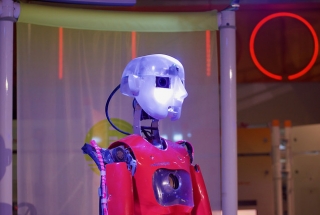Podcast with Roberta Mann available

I Robot: U Tax?
Tuesday 20 March 2018
Roberta Mann,University of Oregon
Listen to a podcast with Roberta Mann
In a 2017 interview, Microsoft founder Bill Gates recommended taxing robots to slow the pace of automation. Funds raised could be used to retrain and financially support displaced workers. Up to 47 per cent of US jobs are at risk by advancements in artificial intelligence. Low-wage workers currently hold a majority of those at-risk jobs. Increased automation is likely to exacerbate income inequality. While employment changes due to automation are not new, advances in artificial intelligence threaten many more jobs much more quickly than historic automation did. When considering how to tax job replacing robots, we should think about the broader purpose of a tax system. Taxes raise revenue, but for whom? The informal title of the most recent tax bill gives a clue: The Tax Cuts and Jobs Act (TCJA). The chairman of the House Ways and Means Committee, Paul Ryan, said the legislation was about “More jobs, fairer taxes, and bigger paychecks. Faster growth and real upward mobility. A strong economy that makes all of us stronger.” At least in terms of political rhetoric, the tax system serves people. Indeed, in the words of a scholar espousing the utilitarianism view of tax policy, “improving aggregate social welfare, as measured by the individual utility levels or happiness of the population, remains one important goal of tax policy.” British philosopher Jeremy Bentham is considered the father of utilitarianism. He was the first philosopher to define the ethics of utilitarianism, under which an action is deemed ethical if it promotes pleasure and diminishes pain. Economic growth has not been found to increase happiness. Increasing the wealth of the already wealthy will not increase happiness, although it might decrease happiness for the stagnating middle class who find themselves falling farther behind. British researcher Andrew Oswald finds (unsurprisingly) that unemployment diminishes happiness. Therefore, if the U.S. tax system exists to serve the American people, it should not lead to unemployment.
More information and registration is available on our events webpage.
Updated: 21 November 2024/Responsible Officer: Crawford Engagement/Page Contact: CAP Web Team










